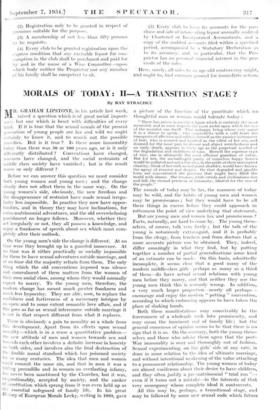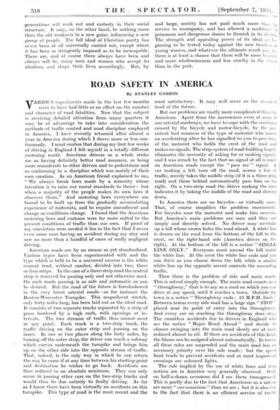MORALS OF TODAY: A TRANSITION STAGE?
By RAY STRACHEY MR. GRAHAM LIPSTONE, in his article last week, raised a question which is of great social import- ance, but one which is beset with difficulties of every kind. If it is true that the sexual morals of the present generation of young people are lax and wild we ought certainly to know it, and to search out the possible remedies. But is it true ? Is there more immorality today than there was 50 or 100 years ago, or is it only differently distributed ? Conventions have changed, manners have changed, and the social restraints of middle class society have vanished ; but is the result worse or only different ?
Before we can answer this question we must consider both young women and young men ; and the change clearly does not affect them in the same way. On the young women's side, obviously, the new freedom and the disappearance of restraint have made sexual irregu- larity less impossible. In practice they now have oppor- tunities, and in theory they may have inclinations, for extra-Matrimonial adventures, and the old overwhelming punishment no longer follows. Moreover, whether they act irregularly or not, they all possess a knowledge, and enjoy a frankness of speech about sex which must com- pletely alter their outlook.
On the young men's side the change is different. At no time were they brought up in a guarded innocence. At no time was it either practically or socially impossible for them to have sexual adventures outside marriage, and at no time did the majority refrain from them. The only thing which the old conventions imposed was silence and concealment of these matters from the women of their own social class, among whOm they would normally expect to marry. To the young men, therefore, the modern change has meant much greater frankness and much less hypocrisy. They are able, now, to replace the sordidness and furtiveness of a mercenary intrigue by an open and to some extent romantic love affair, and if this goes as far as sexual intercourse outside marriage it IS not in that reSpect different from what it replaces.
There is obviously a gain to morality as a whole from this development. Apart from its effects upon sexual moralityr—which is in a sense a quantitative problem— the new attitude of men and women towards sex and towards each other involves a definite increase in honesty on both sides,. and involves also the final destruction of the double moral standard which has poisoned society for so many centuries. The idea that men and women could commit the same sin, and that in men it was a trilling peccadillo and in women an everlasting infamy, Ins never been 'aanctinned by the Churches; but it was unquestionably, accepted by society, and the canker of' prostitution which sprang from it was even held up as the essential safeguard of family life. In his great liktory of European Morals Leaky, writing in 1869, gave a picture of the function of the prostitute which no thoughtful man or woman would tolerate today :
" There has arisen in Society a figure which is certainly the most mournful, and in some respect a t he most awful upon which t he eye of the moralist can dwell. That unhappy being whose very name it is a shame to speak ; who counterfeits with a cold heart the transports of affection and submit a herself as the passive inst rument of lust; who is scorned and insulted as the vilest of her sox, and doomed for the most part to disease and abject wretchedness and an early death, appears in every age as the perpetual symbol of the degradation and sinfulness of man. Herself the supreme typo of vice, she is ultimately the most efficient guardian of virtue. But for her, the unchallenged purity of countless happy homes would be polluted and not a few who, in the pride of their =tempted chastity, think of her with an indignant shudder, would have known the agony of remorse and despair. On that degraded and ignoble form are concentrated the passions that might have filled the world with shame. She remains, while creeds and civilisations rise and fall, the eternal priestess of humanity, blasted for the sins of the people."
The morals of today may be lax, the manners of today may be wild, and the habits of young men and women may be promiscuous ; but they would have to be all these things in excess before they could approach in rottenness the point of view underlying that statement.
But are young men and women lax and promiscuous ? Facts, naturally, are hard to come by. The young them- selves, of course, talk very freely ; but the talk of the young is notoriously extravagant, and it is probably from the clergy, from teachers and from doctors that a more accurate picture can be obtained. They, indeed, differ amazingly in what they find, but by putting together a ntunber of partial generalizations some kind of an estimate can be made. On this basis, admittedly incomplete, it seems clear that a good many of the modern middle-class girls—perhaps as many as a third of them—do have actual sexual relations with young men before they marry, and that neither they nor the young men think this is seriously wrong. In addition, a very much larger proportion—nearly all perhaps— encourage and enjoy the modern " petting " convention, according to which embracing appears to have taken the place of shaking hands.
Both these manifestations may conceivably be the forerunners of a wholesale rush into promiscuity, and may mean the imminent end of family life ; but the general consensus of opinion seems to be that there is no sign that it is so. On the contrary, both the young them- selves and those who advise them agree that the post- War immorality is over and thoroughly out of fashion. Sexual experimenting, on the girls' side at any rate, is done in some relation to the idea of ultimate marriage, and without intentional weakening of the value attaching to a permanent relationship. The young women of today are almost voCiferous about their desire to have children, and they often justify a pre-matrimonial "trial run "— even if it turns out a mistake—in the interests of that very Monogamy whose complete ideal it controverts. All this may be, perhaps, a transitional stage, and may be followed by some new sexual- code which future generations will work out and embody in their social structure. It may, on the other hand, be nothing more than the old weakness in a new guise, influencing a new group of people. The full ideal of Christian purity has never been at all universally carried out, except where it has been so stringently imposed as to be inescapable. There are, and of course there always have been and always will be, many men and women who accept its idealism, and shape their lives accordingly. But, by and large, society has not paid much more than hip service to monogamy, and has allowed a multitude of poisonous and dangerous shams to flourish in its shelter. The strength and appealing power of its ideal are be- ginning to be tested today against the new freedom of young women, and whatever the ultimate result niav be, there is at least a chance that there will be more honesty and more wholesomeness and less cruelty in the future than in the past.







































 Previous page
Previous page